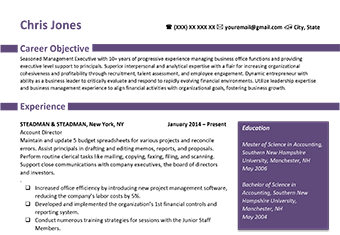Credentials and licenses
A variety of occupations require specific academic credentials and licenses. These are typically in addition to a traditional college education. The importance of credentials and licenses depends on your occupation and can vary greatly.
Read > How To Write a Resume
Ensuring that credentials and licenses are properly displayed should be one of the first steps taken when creating a resume for a position or industry that places high value on such certifications.
Placing your credentials after your name
This is self explanatory – if you are a registered nurse or certified public accountant, place “RN” or “CPA” after your name. Get help with your accounting resume or your nursing resume. The purpose of this is quite simple, that is to immediately communicate to whomever is reading a resume the applicants qualifications.
This may seem like a small change, but for a HR Manager that processes hundreds or thousands of resumes weekly, immediately indicating qualifications may just be the difference between attaining an interview or not.
When you should use a credentials and licenses section
Highlight your credentials if the job you are going after states them as a requirement. Also, you might consider including them if you think they might be of benefit to the employer. For example, you might be a certified accountant but seeking a tax accountant position. In this case being a CPA is not an expressed job requirement but certainly is a plus.
Another example of licenses sections being of use are in industries that require multiple classes of certification or licensing. Aviation is one industry that lends itself to including a separate credentials and licenses section given the different classes of aircraft.
You should NOT waste space on separate credentials and licenses section if you only have one or two, or if they are not directly relevant to the position being applied to. If they are useful but not directly applicable you can include them in an additional skills section. This will still allow you to display credentials without taking up unnecessary space on the resume.
Keep the above types of credentials in mind when resume writing so that nothing of value is left out of the resume. Remember, it is the job of the resume to garner enough interest to schedule an interview, so double checking or writing a list of all of your credentials BEFORE diving into resume writing may be a good idea to ensure nothing of value is forgotten.
Affiliations
There are essentially two primary types of affiliations on a resume – professional and civic. It is beneficial to highlight both either together or separately, depending on the number of your affiliations and your occupation. For example, if your job requires active membership in industry trade groups you should highlight that in a separate section.
Another benefit of participating in affiliations is the possibility of gaining references from other group members. Learn about writing your references section and how references should not always be written on your resume.
Taking part in associations also helps develop skills that employers actually find worthwhile. A lot can be learned from other people in-group settings that can benefit your career progression.
Professional affiliations
This includes organizations or trade groups dedicated to a profession, industry or specialty. If you are not a member of any professional organizations you should consider doing so as it signifies active participation and continued education in your area of expertise.
If you are in school, ask your teacher or student union of the different types of activities that you may partake in. They are usually free to join. Don’t forget to write them down on your resume too! See how you should write a student resume and the main sections of a student resume.
If you currently have a job your workplace may fund you be part of a professional affiliation that teaches you further skills of your trade. Or, if you are part of a trade union the union may organize privately funded events and training to help progress your career in your current workplace. We recommend you ask around to find a group that suits your interests and career plans.
We recommend those that are unemployed to join an affiliation, as it will show that you are pro-active while job searching. Ask your local job center for a list of local affiliations that help people learn skills to re-enter the workforce.
Civic affiliations
This includes community, nonprofit and for fun groups. Write in an achievement oriented manner when describing your participation in civic groups. For example, playing basketball on the weekends is probably not something an employer is interested in knowing. But organizing your coworkers for Habitat for Humanity would be.
Think about volunteering, organizing events, fundraising and any positive contributions you have made to your community. If you did really well in a civic affiliation you may have won an award or honor so be sure to read about writing your awards on your resume. The more information you can add about your extra-curricular and outside employment activities, the better.
Publications and presentations
If you have produced any professional writings or spoken publicly, you should consider including a publications and presentations section. Only include this if it adds to your qualifications as a thought leader and expert in your field. Also ensure that the publications and presentations you choose to display on your resume are relevant to the job you are seeking.
Publications to include
- Books written or contributed to.
- Articles published in newsletters, trade journals, magazines or the internet.
- Masters or Doctoral thesis. Note: If this is the sum of your publications, combine it with your Education section instead.
- Self published booklets, pamphlets and guides.
- Peer-reviewed publications.
- Development of education materials
- Non-profit material such as software, film, videotapes, etc.
Note: If you include other writing, such as scripts and training guides, then you should title the heading “professional writing” rather than “publications”.
Follow the APA citation style, and make sure that they are listed in chronological order. (Oldest publication first.)
Presentations
Include events where you were the primary presenter or co-presenter. These may include presentations made at conferences, symposiums, college classes, and company meetings (don’t include those at the local level).
If you have made many presentations, only select 3-5 that are relevant to the job you are applying for.
First write the name of the presentation in normal font, surrounded by quotes. Then, write the name of the conference, symposium, class, or company meeting in italics. After that, write the locale of the conference, including city and state. Make sure you date it, using only month and year.
Following the above instructions will create a strong resume that will smartly display your writing and presenting talents. If you have a presentation coming up for an interview learn how to prepare for it. Good luck!
Awards and honors
This can include awards relating to your academic achievements (especially important for entry level job candidates), professional accomplishments, and community contributions. Awards and honors are there to reveal that not only are you capable of the demands of your new job but that you are also able to achieve above and beyond that what is expected of you. This looks great on your resume.
You can place any of these types of achievements in a new section, usually after your professional experience section, called “Awards and Honors”. For further information on catching the employer’s eye read how to stand out in a competitive marketplace.
Awards and honors to include
- Scholarships – A scholarship may be fully funded or partly funded by public or private institutions. Regardless of the amount of funding you should state this on your resume as it shows that you are seen by others to have the academic fortitude to complete your line of study.
- Academic competitions – If you are an entry-level candidate and have completed a school or college project both individual and group based that received awards by all means mention it on your resume. This also includes competitions such as spelling contests, sports events, poetry, writing competitions and debating, among many others. It is recommended if these awards from your education are over 5 – 10 years old and not relevant to your line of work you may omit them.
- National competitions – It may be the case that you excelled at a competition at school or via an extra-curricular society and then you were entered into a national or even an international competition. These grand events can certainly be showcased on your resume and will prove to highlight just how outstanding you are on the particular topic you won an award for.
- Sales awards – Any company trying to make revenue will always be impressed by a sales hotshot. Lay your awards down including your industry and dates of achievement. Also mention how much profit or revenue you achieved.
- Productivity and Innovation awards – Developing new technology, aids and ways of improving the world is seen as a great thing by many employers. If you won an award even better, so note it down on your resume.
- Most Valuable Employee awards – Did you save the most amount of money for your organization? Did you increase revenue by the largest amount? Maybe you were the best morale builder or devised the most innovative strategy. Any of these types of awards or honors will make you stand out on your resume.
- Honors bestowed by civic organizations – If you contributed a great deal to your local community or to under-represented groups and was recognized for your hard work then honors bestowed by civic organizations should be written on your resume. They are not given out lightly and stand out incredibly.
- Military commendations – Some veterans believe that they shouldn’t write their military commendations on their resume but this is not the case. Your military commendations should be written like any other awards and honors. An employer should be able to discern from your commendations the type of skills you have learned and how you used those skills to the best of your abilities.
If you only have 1-2 awards
If you only have 1-2 awards you should look to reorganize them into their respective categories. A single item can look sparse on its own, diminishing its impact. It also wastes valuable page real estate and can be distracting (as readers we are naturally drawn to areas of white space).
So, for example, if you won a scholastic award you might consider weaving that under your education or qualifications summary section or if you won sales awards then placing them under your relevant sales position in your professional experience section will suffice.
If you are still a student or have recently graduated but are still lost in the big world of careers and employment then you should read our guide on how to write a resume with no work experience. Take your time and you will get to where you want to get to.
Endorsements
Endorsements are snippets from a letter of recommendation. They are an effective way to add credibility to your resume and are especially suitable for career changers or those re-entering the workforce after an extended hiatus.
Where to get an endorsement
An endorsement could be an excerpt from a letter of recommendation, a positive testimonial sent from a manager or customer, or a recommendation from LinkedIn.com or other website. It should be no longer than one sentence long.
Example of an endorsement: “Peter is one of the top performers I have that has consistently delivered on each quarter’s sales quota – his enthusiasm and work ethic is unparalleled.” (Jane Delmont, VP of Sales, CellularTech Corp.)
Placing individual endorsements under each employer
Another option is to place each endorsement as an individual phrase under each previous employer. It’s a logical way of presenting this information and saves you some space as well.
So now that you’ve decided which sections to add to your resume, it’s time to choose a resume template that fits your needs.







